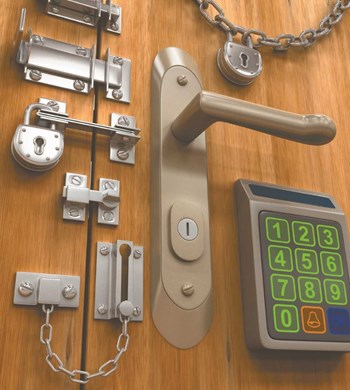
This summer, even with the lingering recession squashing some folks’ plans for elaborate, far-flung vacations, plenty of HOA residents will still pack up for a few days to hit the shore, or perhaps go visit relatives in nearby states.
Whatever the case, it’s important to remember one thing as bags are packed and camping gear loaded into the family car: vacation time means empty houses, and that makes the summer months an especially active time for thieves and other miscreants. According to statistics provided by police departments across New Jersey, the rate of thefts and burglaries increases significantly during July and August. According to security professionals, the key to returning to an intact home is minimizing those opportunities and exercising some common sense.
First Steps in Security
There are plenty of ways to keep crooks at bay—some very simple, others more involved. If your community can make a concerted effort to police itself, and can establish a close relationship with local law enforcement, you’re halfway there already.
Some HOAs opt to work with their local police departments to develop neighborhood watch programs. In addition to fostering good communication and relationships with law enforcement, these programs also encourage residents to take a more active role in policing their community.
For example, in 2007 the board of one large association in Mercer County partnered with its local police precinct to implement a watch program which has now grown to over 600 members who meet once a month to discuss the best ways to protect the community and develop a better understanding of their surrounding neighborhoods. These meetings also offer a forum for residents to notify their fellow members of any upcoming travel plans.
“These programs work,” says one member of the association who also happens to work in law enforcement. “For example, there is another police officer who lives on my street. Last year, we had a number of car burglaries— even my car was broken into—so we got together as a neighborhood and decided to keep our outside lights on all night. We used low-watt bulbs to save money, and you know what? There hasn’t been a break-in since.”
One Step Ahead
Thieves are for the most part shrewd and deceptive by nature, which means homeowners must be equally shrewd and rely on foresight rather than hindsight when it comes to protecting themselves and their property.
Most security professionals recommend developing a friendship with neighbors so they know your routine, know the cars you drive and the company you usually keep, including friends and family who are accustomed to stopping by regularly.
According to Dino Iuliano, a Certified Personal Protection Specialist and an executive vice president at Planned Security Services in Parsippany, it’s a good idea to “tell a trusted neighbor when you’re leaving for an extended period of time and when you’ll return home. And include an itinerary and phone numbers where you can be reached in case of an emergency.”
Many homeowners are rightly hesitant to disclose their travel plans for fear that an unscrupulous person might take advantage of their confidence.
“Having a guard service in a townhome or condo community is an amenity for the property,” says Iuliano, “but there’s no guarantee of security by having a guard, fence, or any other method of protection. Having these items and services is a strong deterrent against criminal activity however, and they can increase property value and reduce insurance costs.”
Other Security Tips
While notifying your neighbors or a trusted property manager is definitely beneficial, the best way to prevent theft is not to advertise your absence to the entire neighborhood in the first place. “You have to create the appearance that the house is occupied and therefore not a target,” says Tony Frusco, director of operations for Marion Security Agency, based in Red Bank.
Frusco and Iuliano offer several simple precautions homeowners can take, including:
• Arranging for a neighbor to park in your driveway while you’re away
• Using timers on some indoor lights and having a neighbor change the settings every few days
• Installing an auto-timer on a radio or television as well
• Having telephone calls forwarded to your cell phone, as burglars have been known to check if someone is home by making a call to the house
• Arranging for someone to cut your grass while you are away
• Advising your security monitoring company that you will be away, when you’ll be back, and who to call in the event of a break-in.
• Security industry professionals particularly encourage homeowners to suspend deliveries of mail and newspapers while they are away, because overflowing mailboxes or a driveway full of newspapers is the equivalent of posting a sign saying, “Come on in, we’re not home!”
“I can’t tell you how many times we’ve been called to a house on a burglary report and pull into the driveway and see 20 old newspapers sitting in the driveway,” says the former Mercer County police officer. “You have to have common sense, and some people just don’t.”
Iuliano agrees that allowing newspapers and mail to pile up is a cardinal sin committed by many homeowners. “This tips intruders off that you are not home,” he says, “so ask a neighbor to collect your mail and newspapers, and offer to return the favor.”
Iuliano also says that other common security blunders include hiding valuables in the bedroom. “It’s the first place burglars tend to look, so think of some non-conventional hiding places, and if possible invest in a water and fire-proof safe.”
Lighting is also a crucial issue. Putting interior and front porch lights on timers that replicate the usual daily schedule often send the message to thieves that they should move along. “Lighting is an important thing to remember, because no thief wants to be seen,” says Frusco.
Iuliano concurs, and calls residents to task for simply leaving the lights on when they’re away. “A light that stays on all the time is no more of a deterrent than a dark house, so invest in an automatic timer instead—and don’t hide your windows with landscaping. Tall bushes and shrubs make it easier for burglars to break open windows without being seen.”
If You See Something, Say Something
Security professionals also suggest that in addition to telling a neighbor or property manager of your travel plans, you also notify your local police department or precinct—but they caution that the cops can only do so much. That’s why it’s so important for HOA residents and boards to support their local police department and act as their communities’ eyes and ears.
Of course, those eyes and ears have to know what to do if something looks fishy or out of place. It does little good if a neighbor notices something out of the ordinary at a fellow association member’s home, but neglects to call the police department until the next day. By that time, the damage is done and all that’s left to do is investigate the crime after the fact.
And while most people cringe at the thought of being cast as the neighborhood busybody, Iuliano says there are certain things that should instantly raise alarms for neighbors. “Anything that seems even slightly out of place for the area or during that time of day,” he says. “For instance, the same car circling the neighborhood, anyone peering into homes, businesses or automobiles, persons loitering around schools, parks, secluded areas or neighborhoods, and loud explosive noises or breaking glass.”
Hi-Tech Solutions
While simple precautions and cooperation between residents and neighbors go a long way toward preventing break-ins and property loss, covering all the bases to burglar-proofing your home might include high-tech devices to help fend off intruders. Home security systems can give residents peace of mind—and there is a plethora of options available for just about any budget.
“Home alarm systems vary, and they can be expensive,” says Frusco, “but it identifies a house as protected, or as not an easy target.”
Frusco explains that the equipment itself is not that expensive for most security systems—it’s the contracts with the security company that can be costly. However, he says that there are lower-tech options, such as installing outdoor sensor lights, that are proven crime stoppers. Another trick that he says many homeowners employ is displaying security signs on the property without actually having the service. “Think about it—if a burglar sees security signs, chances are that he won’t chance a break-in,” Frusco says.
Most people however, are more comfortable with putting up the cash for a real security system than they are with bluffing. Depending on the customer’s needs and budget, their customized security system might include sensors on windows and doors that trigger surveillance cameras that capture the crime on tape. Newer cameras can run on battery power in the event a criminal tries to cut the electricity, and many can be linked to a security system operations center and the police department.
Video monitoring is also being tied into cable service. These systems allow a condominium community or association to pay for a service that allows them to have security cameras around their property in questionable areas like the laundry room and parking lots. These days you can even tie security into your cable service and have a dedicated channel for the community.
Frusco adds that smartphone technology has also added another layer of protection to home security systems. It allows a homeowner to be notified via a phone call or a text along with the police and the security company if their home security system alarm is triggered. “This way if a window is broken, you know it no matter where you are,” he says.
So as you’re planning your long-awaited summer getaway in the next couple of months, it might pay off to factor in some time to think about what steps you’ll take to secure your home and valuables while you’re away. Whether you have an entire new, state-of-the-art security system installed, or just suspend your Sunday paper delivery and have the neighborhood kid mow the grass on weekends depends on your individual circumstances and your budget. Either way, it’s important to plan ahead and protect yourself—because thieves don’t go on vacation.
Hannah Fons is associate editor of the New Jersey Cooperator. Additional research contributed by David Chiu, editorial assistant






Leave a Comment